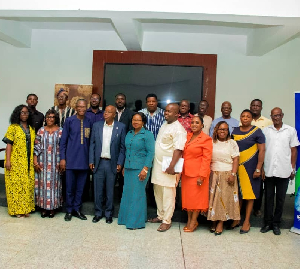Unethical leadership and poor corporate governance are the major causes of persistent losses in Ghana’s state-owned enterprises (SOEs), Dr Alfred Mahamadu Braimah, Chief Executive Officer of the Institute of Directors-Ghana, has asserted.
Speaking at the 2025 Annual Lecture organized by the Faculty of Management Studies at the University of Professional Studies, Accra (UPSA) on Thursday, May 8, Dr. Braimah painted a grim picture of SOE performance, blaming leadership failures for the sector’s inability to contribute meaningfully to national development.
“Clearly, if we are making losses in the state-owned enterprise sector, something is wrong. Two of the key areas that are likely to be the cause are non-ethical leadership and poor, bad corporate governance practices,” he said. “Indeed, the majority of these enterprises are making losses, and instead of contributing to national development, they are draining public resources.”
Dr Braimah, who also serves as Board Chairman of Benso Oil Palm Plantation, expressed concern that many appointees to boards of SOEs lack the necessary training in corporate governance, which affects the institutions’ efficiency and profitability.
“Are the right people being put in there? Are they given the right governance training? Do they really know what they are supposed to do? I think the answer is very clear,” he stated.
He cautioned that unless Ghana embraces ethical leadership and good governance principles, not only will SOEs continue to fail, but the broader public and private sectors will also face long-term consequences.
“How do we get there if we don’t become responsible citizens? If we don’t become ethical leaders? If we don’t run the affairs of government, private sector, or public sector organizations on the basis of good corporate governance principles? How will that happen? And if it doesn’t, ladies and gentlemen, we will all suffer. We will have nowhere else to go. We will all endure a lower quality of life.”
The lecture, held under the theme “Sustainable Governance and Ethical Leadership: Implications for ESG,” emphasized the importance of Environmental, Social, and Governance (ESG) considerations in organizational leadership. Dr. Braimah’s remarks served as a strong call to action for stakeholders in both the public and private sectors to uphold ethics and accountability.
In his opening remarks, Dr. Ernest Mensah Abraham, Acting Dean of the Faculty of Management Studies at UPSA, underscored the relevance of the lecture series as a platform for academia-industry engagement.
He noted that such interactions are vital to bridging the gap between theory and practice, ultimately contributing to the holistic development of students.
“Today’s theme stands at the confluence of purpose, performance, and responsibility. As members of today’s and tomorrow’s generations, we have an obligation to protect, preserve, and conserve our world for posterity,” he said.
Dr Abraham highlighted the evolving expectations of modern leadership, stressing that “leadership is no longer a position—it is a moral contract.”
He explained that in the ESG era, firms are increasingly evaluated not just by their profits but by how those profits are made—through integrity, inclusiveness, and stewardship.
“In the context of ESG, ethical leadership is what transforms policy into practice,” he emphasized. “Without ethical leaders at the helm, ESG becomes a hollow checklist—detached from reality, vulnerable to greenwashing, and ultimately, ineffective.”
He encouraged participants, especially students and professionals, to reflect deeply on the lecture and actively contribute to building a culture of ethical governance.
“Listen, learn, unlearn, and share your thoughts,” he advised.
The public lecture was well attended by faculty members and students of UPSA, representatives from the Institute of Directors-Ghana, and other industry players—underscoring the growing interest in aligning leadership with sustainability and ethical values.



